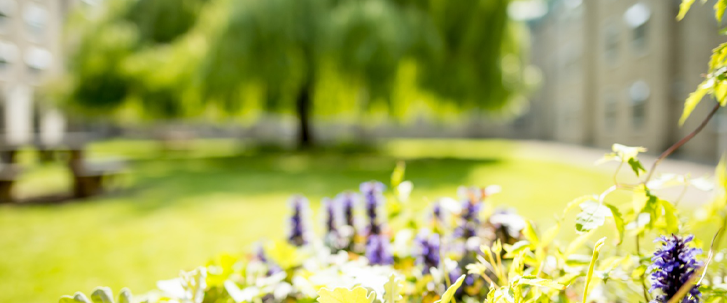
I would like to devote this week’s blog to considerations about how the UK campus could emerge from lockdown, once government signals that current measures can be eased, and to confirm that our new academic year will start, as planned, on 21 September 2020.
Continue to work from home
The Prime Minister's statement on Sunday offered the first indications of what national life might look like in the weeks and months to come. However, it did not signal any significant change in the social distancing restrictions being observed in homes and workplaces across the country.
For our UK campus, this means no immediate change. All staff should continue to work from home until advised otherwise, apart from the small number of designated staff who are maintaining vital campus operations, conducting coronavirus research or supporting those students who remain with us.
Online learning and assessment will continue for the remainder of this term, with our exceptional regulations ensuring that students face no academic disadvantage. We are planning so that students can celebrate their graduation online this summer and will reschedule their ceremonies to a later date so that they can fully celebrate their achievements at Nottingham with friends and family.
Emerging from lockdown
When the time arrives, I appreciate that emerging from lockdown will come with as many, if not more, anxieties than going into lockdown. Our current disquiet is exacerbated by contradictory government leaks, media conjecture and unhelpful scaremongering on social media.
I have spoken with, and heard from, dozens of staff and students over the last few weeks and most recently have sought ideas about how we might emerge from lockdown when we are allowed to do so. The recurring themes have been an over-riding concern for health, safety and wellbeing; unease from staff about workload; and expectations from students that they will be treated fairly in their access to education and assessment.
In all the plans that we develop as a University over the coming weeks, I am determined that we keep these concerns and sensitivities at the forefront of our thinking, with the health, safety and wellbeing of our staff and students at the heart of any decisions we make.
Recovery Planning
We have now convened a Recovery Group, chaired by Deputy Vice-Chancellor Professor Andy Long, that will plan for the adjustments we will need to make in the coming weeks, including how and when different campus research facilities can be re-opened and the additional health and safety measures that will be required. Detailed work is also being undertaken with Schools and Departments to develop plans for teaching and assessment in the 2020-21 academic year.
Colleagues across the University will be invited to contribute to the Recovery Group’s work to ensure we have a consistent and co-ordinated approach to health and safety. We will ensure that our community is updated regularly on the Group’s discussions, and engage with both the students’ and staff unions. Professor Long will publish regular communications to keep you all informed.
While there are numerous unknowns and challenges ahead, we can learn from other countries. The University, uniquely for a UK institution, has already successfully re-opened a campus to staff and students. Having moved to online teaching for its students earlier this year, the University of Nottingham, Ningbo China became the first Sino-foreign institution to fully re-open its campus last week, recommencing teaching in person for more than 5,000 students. It will be helpful to us in the coming weeks to apply lessons from our experiences in China.
I personally have the privilege of chairing Universities UK’s Recovery Sounding Board where I am able to learn from the work of institutions across the country and consider examples from universities around the world who are ahead of us in restoring on-campus activity.
Supporting our staff
When we have eventually emerged from lockdown, University life will look and feel very different. For the foreseeable future, we will need to adapt our buildings, introduce social distancing measures and adjust the ways in which we teach, research and work.
I know that there will be concerns among staff about what impact these changes will have on their workload and wellbeing, where we may for example face the challenge of delivering a mix of online and in-person teaching and research alongside social distancing measures. Our new Workload task group, sponsored by Pro-Vice-Chancellor for Equality, Diversity & Inclusion, Professor Sarah Sharples, will examine these challenges in depth.
The student experience
In starting our new academic year on 21 September as planned, subject to the restrictions in force at the time, we will want to offer our students as much in-person teaching as possible. We commit to retaining our high standards, although social distancing restrictions may mean that we need to supplement teaching with online resources so that everyone will be able to participate in discussions and learning.
For applicants and those considering joining us in September, Virtually Nottingham will provide a series of online lectures, videos, and live chats with current students and staff to help prospective students discover Nottingham. We hope this will be an engaging way of showcasing what we have to offer and will help exemplify how universities continue to be ever more relevant in challenging times.
Please continue to contact me directly and send me your reflections on lockdown, what you think we should retain and what we should change in the future at vc-covidrecovery@nottingham.ac.uk. I promise to acknowledge all emails, and your ideas will inform the way we move forward. I look forward to working with colleagues across the institution to plan and deliver our recovery.

Professor Shearer West
Vice-Chancellor
11 May 2020